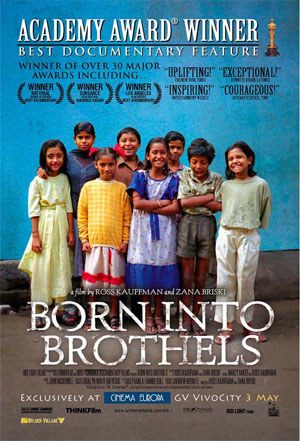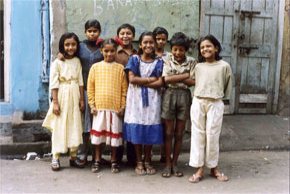|
Genre:
Documentary/Photography
Director: Ross Kauffman and Zana Briski
Starring: Avigit, Gour, Puja, Kochi, Manik,
Shanti Das, Suchitra, Tapasi
RunTime: 85 min
Released By: Archer Entertainment
Rating: NC-16
Official Website: http://www.archerentasia.com/bornintobrothels/
Opening Day: 3 May 2007
Synopsis:
Winner, “Best Documentary Feature” at the 77th
annual Academy Awards, 2005
In the dark underworld of Calcutta's overcrowded red light
district appear a group of unforgettable children. Feisty,
courageous, and wickedly funny - they are the children of
prostitutes and drug addicts, and whose futures have so far
been dictated by their surroundings.
By a chance encounter, these children embark on a transformational
journey with New York based photographer Zana Briski, who,
over the course of three years, teaches them photography.
The results are life-changing.
BORN INTO BROTHELS is a humorous and life-affirming true story
of the resilience of children and the power of art to transform
even the most unlikely of circumstances.
Movie Review:
It seems almost impossible to create such a documentary without
getting personally invested into the lives of those situated
in the locale of “Born Into Brothels”. The denizens
in the Calcutta red-light district exist in a sort of socioeconomic
limbo. Cast aside from the rustic charms of the Indian countryside
where some live in enviable harmony with nature and others
who are cloaked in the indifference of a prospering economy,
the child prostitutes in Zana Briski and Ross Kauffman’s
Oscar winning documentary manage to subsist right in the middle
of these painfully close ways of life. They are in bondage
to the legacy left to them by their elders and are seemingly
destined to carry forward the fatalism of their heinous occupation
to their own progenies. In this respect, the gift that these
particular filmmakers offer their subjects is not just the
promise of exposure to their unseen plight but a very real
chance to escape the cycle.
By
the film’s end, we realise that its strongest suit is
possibly its weakest as well. The duo’s close proximity
and attachment to each child opens up a rewardingly trenchant
perspective that we wouldn’t have been able to get otherwise.
But then again, it is this narrow and obscured view that hinders
a complete spectrum of this vile practice in the country’s
provinces. It is indeed as much about the filmmakers as it
is about its subject and Briski’s struggles with the
bureaucracy and the insidious caste system that threatens
to exclude her efforts to help the pubescent group of boys
and girls to whom we are introduced. These children are shown
to be intelligent and through interviews, we discern their
underlying sense of wisdom about the world around them and
the fascination with Briski’s interaction is a welcome
retreat from the sadness that permeates their livelihoods.
A
criticism can be levelled at its crew in this case when the
complexities of grassroots efforts in the country remain ignored
in lieu of Briski’s borderline indulgent commentary
about her personal sacrifices and devotion to her blossoming
protégés. The situation that Briski and Kauffman
find themselves in can be easily misconstrued as a self-congratulatory
pat on the back for white charity that redefined the meaning
of prostitution that can be understandable from a prima facie
outlook. And in all honesty, the cynical thought did cross
my mind as I recall its Academy Award win. But then again,
given that its alternative is letting the atrocities go unwitnessed,
that momentary betrayal to the spirit of the documentary is
swiftly driven out.
The
potential for change in the lives of the featured few is highlighted
in a big way. I will not pretend to understand or chastise
those who have refused the opportunity presented to them because
of the unsettlingly unexplainable reason that I am here and
they are there. But its effects still continue to be felt
in the few children (and more crucially, the parents) who
chose to accept the changes to their ingrained, hardened way
of life by allowing the chains to be finally broken.
Movie
Rating:
   
(Affecting
piece of filmmaking that could have used more polish and a
amplified perspective of its subject matter to greater effect)
Review by Justin Deimen
|





